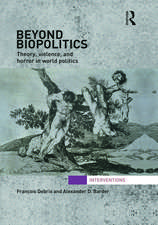Empire Within: International Hierarchy and its Imperial Laboratories of Governance: Interventions
Autor Alexander Barderen Limba Engleză Paperback – 26 oct 2017
The invasions of Afghanistan in 2001 and Iraq in 2003 forced the United States to experiment and innovate in considerable ways. Faced with growing insurgencies that called into question its entire mission, the occupation authorities engaged in a series of tactical and technological innovations that changed the way it combated insurgents and managed local populations. The book presents new material to develop the argument that imperial and colonial contexts function as a laboratory in which techniques of violence, population control and economic principles are developed which are subsequently introduced into the domestic society of the imperial state. The text challenges the widely taken for granted notion that the diffusion of norms and techniques is a one-way street from the imperial metropole to the dependent or weak periphery.
This work will be of great interest to scholars of international relations, critical security studies and international relations theory.
| Toate formatele și edițiile | Preț | Express |
|---|---|---|
| Paperback (1) | 445.95 lei 6-8 săpt. | |
| Taylor & Francis – 26 oct 2017 | 445.95 lei 6-8 săpt. | |
| Hardback (1) | 1052.35 lei 6-8 săpt. | |
| Taylor & Francis – 19 mar 2015 | 1052.35 lei 6-8 săpt. |
Din seria Interventions
-
 Preț: 297.79 lei
Preț: 297.79 lei -
 Preț: 310.65 lei
Preț: 310.65 lei -
 Preț: 309.41 lei
Preț: 309.41 lei -
 Preț: 319.01 lei
Preț: 319.01 lei -
 Preț: 327.40 lei
Preț: 327.40 lei -
 Preț: 156.44 lei
Preț: 156.44 lei -
 Preț: 128.80 lei
Preț: 128.80 lei - 9%
 Preț: 1041.01 lei
Preț: 1041.01 lei -
 Preț: 112.30 lei
Preț: 112.30 lei -
 Preț: 123.84 lei
Preț: 123.84 lei -
 Preț: 302.17 lei
Preț: 302.17 lei -
 Preț: 286.66 lei
Preț: 286.66 lei -
 Preț: 309.65 lei
Preț: 309.65 lei -
 Preț: 111.26 lei
Preț: 111.26 lei -
 Preț: 312.36 lei
Preț: 312.36 lei -
 Preț: 309.70 lei
Preț: 309.70 lei -
 Preț: 311.48 lei
Preț: 311.48 lei -
 Preț: 379.30 lei
Preț: 379.30 lei -
 Preț: 279.25 lei
Preț: 279.25 lei -
 Preț: 189.29 lei
Preț: 189.29 lei -
 Preț: 303.01 lei
Preț: 303.01 lei -
 Preț: 342.07 lei
Preț: 342.07 lei -
 Preț: 443.86 lei
Preț: 443.86 lei - 18%
 Preț: 1055.06 lei
Preț: 1055.06 lei - 18%
 Preț: 999.51 lei
Preț: 999.51 lei - 28%
 Preț: 880.72 lei
Preț: 880.72 lei - 18%
 Preț: 1057.05 lei
Preț: 1057.05 lei - 18%
 Preț: 1001.90 lei
Preț: 1001.90 lei -
 Preț: 411.42 lei
Preț: 411.42 lei - 18%
 Preț: 1005.04 lei
Preț: 1005.04 lei - 18%
 Preț: 703.61 lei
Preț: 703.61 lei - 18%
 Preț: 1108.73 lei
Preț: 1108.73 lei - 18%
 Preț: 699.96 lei
Preț: 699.96 lei - 18%
 Preț: 1005.04 lei
Preț: 1005.04 lei -
 Preț: 409.69 lei
Preț: 409.69 lei - 18%
 Preț: 1055.32 lei
Preț: 1055.32 lei - 18%
 Preț: 1109.99 lei
Preț: 1109.99 lei - 18%
 Preț: 1056.00 lei
Preț: 1056.00 lei -
 Preț: 393.86 lei
Preț: 393.86 lei - 18%
 Preț: 1113.95 lei
Preț: 1113.95 lei - 18%
 Preț: 1111.72 lei
Preț: 1111.72 lei - 18%
 Preț: 1053.79 lei
Preț: 1053.79 lei -
 Preț: 393.93 lei
Preț: 393.93 lei - 18%
 Preț: 1059.48 lei
Preț: 1059.48 lei - 28%
 Preț: 822.36 lei
Preț: 822.36 lei -
 Preț: 416.26 lei
Preț: 416.26 lei - 18%
 Preț: 1282.19 lei
Preț: 1282.19 lei
Preț: 445.95 lei
Nou
Puncte Express: 669
Preț estimativ în valută:
85.34€ • 92.67$ • 71.69£
85.34€ • 92.67$ • 71.69£
Carte tipărită la comandă
Livrare economică 22 aprilie-06 mai
Preluare comenzi: 021 569.72.76
Specificații
ISBN-13: 9780815377184
ISBN-10: 0815377185
Pagini: 180
Dimensiuni: 156 x 234 x 10 mm
Greutate: 0.37 kg
Ediția:1
Editura: Taylor & Francis
Colecția Routledge
Seria Interventions
Locul publicării:Oxford, United Kingdom
ISBN-10: 0815377185
Pagini: 180
Dimensiuni: 156 x 234 x 10 mm
Greutate: 0.37 kg
Ediția:1
Editura: Taylor & Francis
Colecția Routledge
Seria Interventions
Locul publicării:Oxford, United Kingdom
Public țintă
Postgraduate and UndergraduateCuprins
Introduction Empire as International Hierarchy 1. International Relations Theory: Hierarchy and the Problem of Empire 2. Imperial Laboratories of Violence: A Genealogy of the Camp 3. Imperial Subjects at Home and The Rise of the Modern Surveillance State 4. American Hegemony and the Neoliberal Laboratory in the Americas 5. Conclusion Global War Comes Home
Recenzii
This important book challenges some of the foundational categories and assumptions of mainstream international relations theory by insisting that practices that take place in the colonies inevitably travel back to the metropole and transform modes of governance and governmentality at home. By examining the displacement of the camp as a technique of carcerality, surveillance technologies, and neoliberal political economies from "over there" (Iraq, Afghanistan or Latin America) to "over here", Barder brilliantly shows the processes that are central to the imperial management of populations at home and abroad.
Laleh Khalili, School of Oriental and African Studies, UK
In this outstanding book, Alexander Barder provides a powerful and enticing account of the centrality of hierarchy in the international movement of norms and practices. Offering a fascinating analysis of transnational flows of violence, surveillance techniques and neoliberal policy, Barder reveals the multidirectional diffusion of norms, which transforms not only imperial domains but also their metropoles. Especially noteworthy is the focus on the experimentation of the United States in its periphery, experimentation which comes to have ramifications for U.S. democracy. Empire Within is a must-read for scholars interested in norm diffusion, globalization [human rights?] and hierarchy in international society Ann Towns, University of Gothenburg, Sweden.
Alexander Barder has returned imperialism to international relations theory, which had long persisted in the view that the world is flat. His geography is more uneven, but with imperial power nonetheless on display here and there. And then what it learns 'there' is not insulated, but makes its way back 'here.' A terrific antidote to the leaden approaches to international power.
Vijay Prashad, author, The Poorer Nations: A Possible History of the Global South.
If empire’s victims intuitively recognise in the sufferings of the metropoles’ peoples a repeat of their own experience of violence and erasure, Empire Within unravels the genealogy of this disturbingly common destiny. Barder offers a fascinating, chilling account of empire brought home, and a reminder that knowledges rarely stagnate or dissolve — in the flux of human activity nothing is lost, all is translated. This simultaneously delineates a new horizon of postcolonial solidarity born of a shared experience that can reinvest older knowledges of resistance for today’s common struggles.
Inanna Hamati-Ataya, Aberystwyth University, UK
Laleh Khalili, School of Oriental and African Studies, UK
In this outstanding book, Alexander Barder provides a powerful and enticing account of the centrality of hierarchy in the international movement of norms and practices. Offering a fascinating analysis of transnational flows of violence, surveillance techniques and neoliberal policy, Barder reveals the multidirectional diffusion of norms, which transforms not only imperial domains but also their metropoles. Especially noteworthy is the focus on the experimentation of the United States in its periphery, experimentation which comes to have ramifications for U.S. democracy. Empire Within is a must-read for scholars interested in norm diffusion, globalization [human rights?] and hierarchy in international society Ann Towns, University of Gothenburg, Sweden.
Alexander Barder has returned imperialism to international relations theory, which had long persisted in the view that the world is flat. His geography is more uneven, but with imperial power nonetheless on display here and there. And then what it learns 'there' is not insulated, but makes its way back 'here.' A terrific antidote to the leaden approaches to international power.
Vijay Prashad, author, The Poorer Nations: A Possible History of the Global South.
If empire’s victims intuitively recognise in the sufferings of the metropoles’ peoples a repeat of their own experience of violence and erasure, Empire Within unravels the genealogy of this disturbingly common destiny. Barder offers a fascinating, chilling account of empire brought home, and a reminder that knowledges rarely stagnate or dissolve — in the flux of human activity nothing is lost, all is translated. This simultaneously delineates a new horizon of postcolonial solidarity born of a shared experience that can reinvest older knowledges of resistance for today’s common struggles.
Inanna Hamati-Ataya, Aberystwyth University, UK
Descriere
This work seeks to illuminate the various ways in which the management of imperial or hegemonic spaces contribute to the emergence of more coercive apparatuses of state control.











